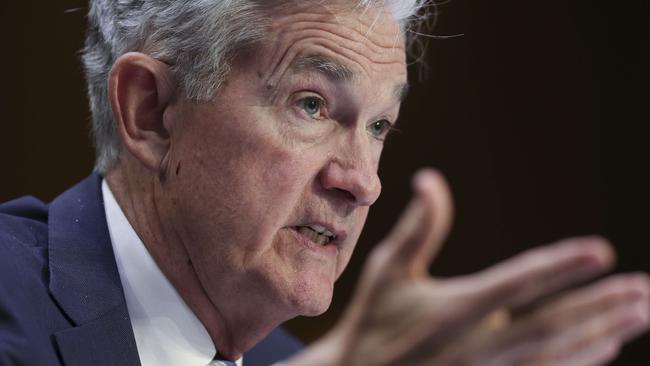US Fed Reserve must accept higher recession risk to curb inflation: Powell
“There’s a clock running here,” US Federal Reserve chairman Jerome Powell says on the need to stamp out inflation before it becomes entrenched, justifying the most aggressive pace of rate rises since the 1980s.

Federal Reserve Chairman Jerome Powell is more concerned about the risk of failing to stamp out high inflation than about the possibility of raising interest rates too high and pushing the economy into a recession.
“Is there a risk we would go too far? Certainly there’s a risk,” Mr Powell said during a moderated discussion at the European Central Bank’s annual economic policy conference in Portugal.
“The bigger mistake to make – let’s put it that way – would be to fail to restore price stability.”
Fed officials are raising rates at the most aggressive pace since the 1980s in part because of concerns that higher prices could change consumer psychology in ways that sustain high inflation.
Economists believe expectations of future inflation can be self-fulfilling, which means the Fed could be required to lift rates higher than otherwise if those expectations rise.
Mr Powell said the central bank had to raise rates rapidly, even if that raises the risk of recession, to avoid a worse danger for the economy – of higher inflation becoming entrenched. He said the Fed didn’t have the luxury of moving rates up gradually because of concern that the recent period of high inflation may lead consumers and price setters to expect elevated prices to persist.
“There’s a clock running here,” Mr Powell said during a moderated discussion at the European Central Bank’s annual economic policy conference in Portugal.
“The risk is that because of the multiplicity of shocks, you start to transition into a higher-inflation regime.
“Our job is literally to prevent that from happening, and we will prevent that from happening.”
Central banks across the globe are in a hurry to raise interest rates amid surging price pressures.
Rising fuel costs and supply-chain disruptions from Russia’s war against Ukraine have sent prices higher in recent months. In the US, such increases are adding to inflation that was already high as demand surged last year from the reopening of the economy and aggressive government stimulus.
Since March, the Fed has raised its benchmark federal-funds rate three times from near zero to a range between 1.5 per cent and 1.75 per cent, including a 0.75-percentage-point rise this month, the largest in 28 years.
Mr Powell and many of his colleagues have signalled that another increase of that magnitude is likely to be warranted at the Fed’s next meeting, July 26-27.
Mr Powell’s remarks are his latest stressing that the Fed will keep raising rates until it believes inflation is under control, even if that causes a recession.
While recessions are painful, typically resulting in lost jobs and economic output, Fed officials believe that high inflation is worse because waiting to address it could require an even more severe downturn later.

His message is aimed at preventing inflation expectations from rising and helping investors anticipate future rate increases.
Cleveland Fed President Loretta Mester framed the central bank’s approach in very similar terms on a separate panel at the conference.
She said it would be more harmful for the Fed to assume incorrectly that inflation would return to low levels than it would to err on the side of raising rates too much and to discover that inflation expectations were still anchored at lower levels.
“The more costly error is assuming inflation expectations are anchored when they are not,” she said.
Europe’s top central bankers, speaking on the same panel as Mr Powell, indicated they would proceed more cautiously than the Fed in increasing interest rates as they gauge the economic fallout of the war in Ukraine.
The conflict is driving up energy and commodity prices in Europe while sapping consumers’ purchasing power in a region that relies heavily on imported energy.
“Moving gradually is certainly appropriate in times of high uncertainty,” said ECB president Christine Lagarde.
Ms Lagarde reaffirmed plans to gradually raise the bank’s key interest rates at policy meetings in July and September.
She said the bank could move more quickly if it became easier to judge the trajectory of the economy.
Eurozone inflation hit a record of 8.1 per cent in May.
The ECB has signalled it will increase its key rate, currently set at minus 0.5 per cent, by 0.25 percentage point in July and possibly by a larger amount in September.
Bank of England governor Andrew Bailey said the UK economy was dealing with “a very large national real income shock” as a result of the war, and that it wasn’t clear how that would pass through to inflation.
Mr Bailey signalled that UK policy makers could consider a 0.5 percentage point interest-rate rise at their July policy meeting if there are persistent signs that price increases are a problem. The bank increased its key rate by 0.25 percentage point earlier this month, to 1.25 per cent, as inflation rose above 9 per cent.
“There will be circumstances in which we will have to do more. We’re not there yet,” Mr Bailey said.

While some analysts are optimistic that a slowdown in US demand for consumer goods could lower overall inflation rates, Mr Powell has said the Fed wants to see clear and convincing evidence that price pressures are diminishing before slowing or suspending rate increases.
Most Fed officials have said they want to raise the fed-funds rate quickly to between 3 per cent and 3.5 per cent later this year before assessing how much higher to lift it next year.
The Fed is hoping to slow US economic growth enough to bring down inflation but without causing a recession – a so-called soft landing.
Mr Powell has warned in recent weeks that the war in Ukraine, which is pushing up food and energy prices, has made this outcome more difficult.
“There’s no guarantee” of a more benign outcome, Mr Powell said.
“It has gotten harder. The pathways have gotten narrower.”
Later, he added, “The process is highly likely to involve some pain, but the worse pain would be in failing to address this high inflation and allowing it to become persistent.”
For years following the 2008 crisis, large economies had relied heavily on central banks to boost demand, leading to a frequent quip that they were the “only game in town”.
Mr Powell said he was concerned that this was again true but now in the opposite direction: that governments would rely excessively on central banks to bring down inflation by squeezing demand rather than by addressing constraints on the economy’s capacity to produce more goods and services or to boost workforce participation.
“There’s much too much focus on demand management,” he said.
He declined to elaborate on what other policies might be pursued to help economies maximise growth.
Mr Powell said it was an open question whether forces unleashed by the 2020 coronavirus pandemic might continue to fuel higher inflation or volatility in price pressures than before.
Over the preceding 25 years, and especially after the 2008 financial crisis, central banks instead navigated an environment of lower inflation and very low interest rates. If the global economy is moving into a period of persistently higher inflation, that would have important ramifications for interest rates, asset values, and economic management.
“I don’t think that we are going to go back to that environment of low inflation,” said Ms Lagarde.
Nearly all central banks have struggled to forecast inflation over the past year.
Pressed over whether central banks now had a better grasp of price-setting dynamics, Mr Powell responded, “We now understand better how little we understand about inflation.”
The Wall Street Journal



To join the conversation, please log in. Don't have an account? Register
Join the conversation, you are commenting as Logout